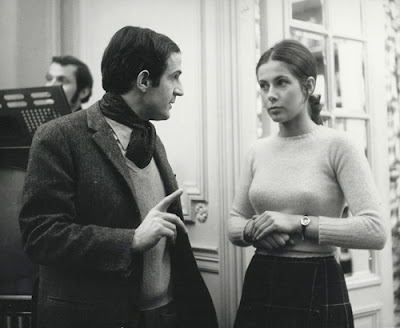And so to the now rated BARRY LYNDON which was not at all boring, as I and the dogs found last time when Q. was in Tenegrief (actually the dogs were asleep, but this could have been down to boredom).
The cast is interesting, from the greatly undervalued Leonard Rossiter (a scared officer, below) to the familiar reliability of Hardy Kr
üger, with Murray Melvin slyly watchable as Rev. Runt. Philip Stone - The Shining's eternal barman - features briefly, and Barry's young stepson Dominic Savage wrote and directed TV's Freefall earlier this year.
Michael Hordern's ironic voiceover and the formal and deliberate structure of the film beautifully balance the 18th Century setting and wry turn of events.
(Kubrick) "I first came across the Handel theme [Sarabande] played on a guitar, and strangely enough it made me think of Ennio Morricone."
(It can't have been
this rendition - it's too recent - but this is a beautiful version.) Leonard Rosenman at one point dramatically orchestrates it on timpani alone, and effectively uses other music like the Irish melodies early on.
Now the cinematography, at no. 16 in the
ASC's Best Shot Films 1950 - 1997, as much I think for Kubrick's technical skills as to those of the photographer alone. (What is
Psycho doing at no. 15, by the way? Apart from this, John L. Russell has no notable credits, just a welter of B movies. It wouldn't surprise me at all to hear that Hitch chose all the lenses and compositions. In fact my only complaint about
Psycho is that it isn't shot by Hitch's regular Robert Burks.) This is I think one of the best shot films of all time. John Alcott took over from Unsworth after six months on
2001 (no. 3 in the list), then photographed
A Clockwork Orange. For this film he
"studied the lighting effects achieved in the paintings of the Dutch masters but they seemed a bit flat [also not quite the right period?] so we decided to light more from the side... an awful lot of diffusion was being used in cinema at the time".
(Kubrick again) "I have always tried to light my films to emulate natural light."
Thus daylight was used as much as possible, or diffused light (Alcott lighting through windows with mini Brutes through plastic material):
"If you shoot towards the window you get a very beautiful and realistic flare effect."
For the much discussed candlelit scenes, Kubrick found a 50mm Zeiss f. 0.7 lens, 100% faster than any other existing lens, developed by NASA. It was adapted by Cinema Products Corp, on an old Mitchell BNC with a projector lens adapter to give a 35.5mm length. President Ed Di Giuliu recalls:
"He wanted to preserve the natural patina and feeling of these old castles at night as they actually were. The addition of any fill light would have added an artificiality to the scene."
The equipment produced a very short depth of focus, no problem for NASA when shooting at infinity focus, but rather more problematic shooting candlelit actors. These scenes are still extraordinarily beautiful and haven't been surpassed. The slow 10-1 zooms out (on an Arriflex 35BL, whatever that is) are also most distinctive.
(Alcott) "That old bit that says you cut because the sun's gone in doesn't go any more." (Noticeable in scene where Barry buys son a horse.)
More 4's print is correctly at the peculiar ratio of 1.59:1.














